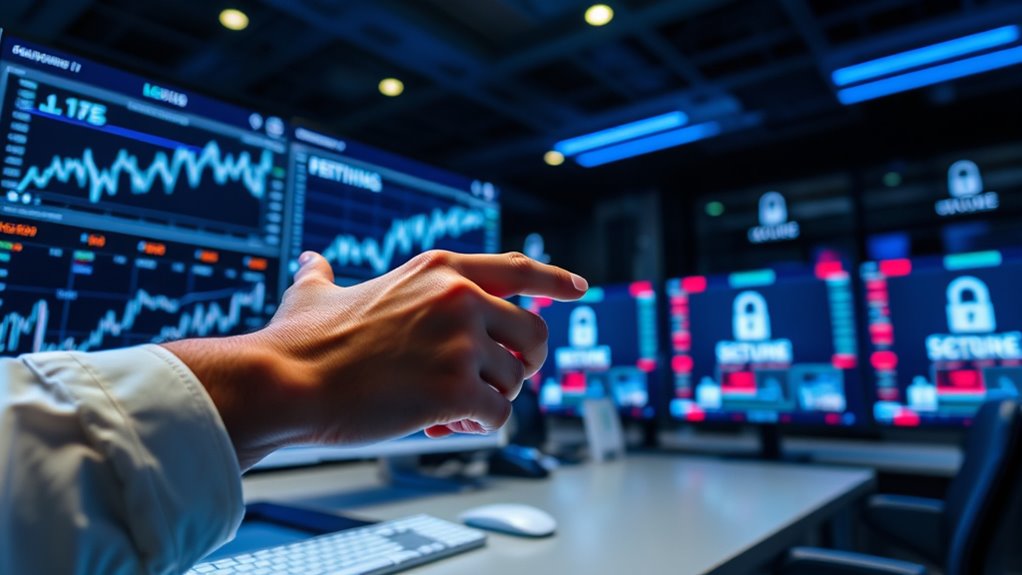Your funds on major crypto exchanges are generally safe if you follow key security practices like enabling two-factor authentication, choosing platforms that securely store assets offline in cold wallets, and staying vigilant against phishing scams. Reputable exchanges prioritize multi-layered security measures, including encryption, multi-signature transactions, and regular audits. However, nothing is completely risk-free, so it’s important to stay informed about the latest security updates. Keep going to discover how to further protect your assets effectively.
Key Takeaways
- Major exchanges implement two-factor authentication (2FA) to protect user accounts from unauthorized access.
- Most assets are stored offline in cold wallets, reducing the risk of cyberattacks on large holdings.
- Reputable platforms use multi-layered security measures, including encryption, multi-signature transactions, and regular audits.
- Hot wallets are used for liquidity but are secured with strict protocols to minimize online exposure.
- Users should enable all security features, stay vigilant against phishing, and choose exchanges with transparent security practices.

Have you ever wondered how digital exchanges keep your assets safe? It’s a valid concern, especially when you’re entrusting your hard-earned funds to a platform that operates online. One of the key security measures you should look for is two factor authentication (2FA). This simple yet effective tool adds an extra layer of protection by requiring a second form of verification beyond just your password. When you enable 2FA, you typically use an app like Google Authenticator or receive a code via SMS, making it much harder for hackers to access your account even if your password gets compromised. Many major exchanges prioritize implementing 2FA, and it’s often considered the minimum standard for account security. Without it, your account remains vulnerable to various cyber threats.
Understanding hot wallet security is equally vital when evaluating how safe your funds are on a platform. Hot wallets are digital wallets connected to the internet, used for quick access and transactions. While they’re convenient, they also pose a higher risk of hacking. Reputable exchanges tend to keep the majority of their funds in cold storage — offline wallets that are far less susceptible to cyberattacks — but they still need to manage hot wallets effectively. Good hot wallet security involves robust cybersecurity measures such as encryption, multi-signature transactions, and regular security audits. You should also check if the exchange employs real-time monitoring for suspicious activity and has clear protocols for responding to breaches. These measures help prevent hackers from draining hot wallets and ensure your funds are better protected against online threats.
Additionally, secure exchanges often combine multiple security strategies. For example, they might use cold storage for the bulk of their assets, enforce strict user verification processes, and regularly update their security protocols to stay ahead of emerging threats. They also educate users about best practices, like avoiding phishing scams and keeping their login credentials confidential. Transparency plays a big role here; trustworthy platforms openly share their security practices and incident response strategies, giving you confidence that your assets are in good hands. Implementing comprehensive security measures, such as multi-layered protection, is crucial in safeguarding your digital assets. While no system is completely foolproof, choosing an exchange that emphasizes two factor authentication and hot wallet security markedly reduces the risk of losing your assets. Staying vigilant, enabling all available security features, and understanding how your chosen platform safeguards your funds are essential steps towards making your digital asset experience safer.
Frequently Asked Questions
How Do Exchanges Handle User Data Privacy?
You should know that exchanges handle your data privacy by using strong encryption protocols to protect your information. They often require your explicit user consent before collecting or sharing data, ensuring transparency. By implementing these measures, exchanges aim to secure your personal details from unauthorized access and maintain your trust. Always review their privacy policies to understand how your data is used and protected.
What Are the Common Signs of a Compromised Exchange?
You might notice unusual activity, like unexpected withdrawals or login attempts, which could hint at a compromised exchange. Be alert to phishing attacks that trick you into revealing sensitive info and insider threats that compromise security from within. Sudden account lockouts, suspicious emails, or inconsistent transaction histories are signs your exchange’s safety might be compromised. Stay vigilant and regularly monitor your account for any irregularities to protect your funds.
Can I Recover Funds After an Exchange Hack?
Yes, you can often recover funds after an exchange hack by following recovery procedures provided by the platform or legal recourse if necessary. First, contact the exchange’s support team promptly and report the incident. They may have specific recovery procedures in place. If that doesn’t work, consider consulting legal professionals to explore legal recourse for recovering your stolen funds. Stay vigilant and act quickly to maximize your chances.
How Often Are Security Audits Conducted?
Most major exchanges conduct security audits regularly, often quarterly or biannually, to guarantee their security protocols stay effective. These audit frequencies help identify vulnerabilities early and protect your funds from potential threats. You should check with your platform to see their specific schedule, but know that ongoing audits are a key part of maintaining a secure environment. Staying informed about audit frequency helps you trust your exchange’s commitment to security.
Are There Insurance Policies for Lost Funds?
Yes, some platforms offer insurance coverage for lost funds, providing you with added protection. This insurance helps with loss mitigation if your assets are compromised due to hacks or other security breaches. However, not all exchanges have such policies, so it’s essential to verify whether your platform provides insurance and understand its coverage limits. Always stay informed about their security measures to ensure your funds are as safe as possible.
Conclusion
While major exchanges invest heavily in security, no platform is entirely foolproof. Think of their defenses like a fortress—strong walls, guards, but still vulnerable to clever intruders. Trusting your funds involves understanding these risks and diversifying storage methods. Remember, even the safest platforms can face breaches. So, stay vigilant, use strong security measures, and don’t keep all your assets in one place. Protecting your funds is ultimately your responsibility.








